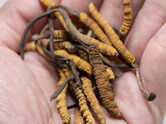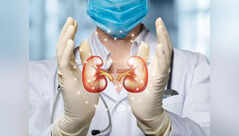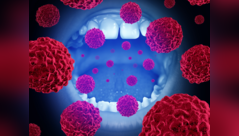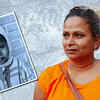01/6Mouth cancer is common in India

Mouth cancer can develop in any parts that make up the mouth or oral cavity, such as the lips, gums, tongue, inner lining of the cheeks, roof of the mouth, and floor of the mouth under the tongue.
Oral cancer or mouth cancer is one of the most common cancers in India. According to a 2020 paper published in Science Direct, tobacco consumption has been the predominant factor causing oral cancer – consumed in the form of gutka, zarda, khaini, cigarettes, bidi, hookah, etc. It is a major cause of tumor development in the oral cavity in both the young and adult Indian population.
Following are some signs and symptoms associated with mouth cancer that should not be ignored:
02/6White patches


Red or white thick patches can appear on the gums, tongue, tonsil, or lining of the mouth. This is called leukoplakia. Most leukoplakia patches are non-cancerous, however, some can show early signs of cancer. These may be caused by usage of tobacco products. It is best to consult a doctor if you develop these patches.
03/6Unexplained, persistent lumps


You may develop unexplained lumps or growths in the mouth or in the lymph glands (in the neck) that do not go away. You may also have a persistent feeling that something is caught in your throat or experience a sore throat.
04/6Pain or numbness


Numbness, loss of feeling, pain or tenderness in any area of the face, mouth, or neck that without any apparent cause could be a sign of oral cancer. You may also develop swelling or pain in your jaw. If you use dentures, they might be uncomfortable or hard to put in.
05/6Loss of teeth


One or more teeth may become loose for no other obvious reason, which could be a sign of cancer. Or you may notice that a tooth socket does not heal after extraction. You may also experience a change in the way your teeth or dentures fit together.
Read more: New skin-rotting drug is "zombifying people's bodies" in the US
06/6What are the treatment options?


Once oral cancer is diagnosed, treatment can be started – depending on the location, stage, and type of cancer. The individual’s overall health is also taken into consideration. There are a number of treatment options such as surgery, radiation, and chemotherapy.






























































































closecomments
SIGN IN WITH
FacebookGoogleEmail